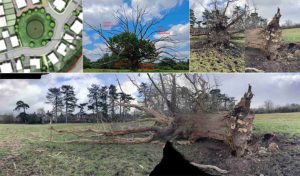Veteran tree management plans act as a significant project benefit to be inserted on the positive side of the planning balance
An ancient or veteran tree is defined in the NPPF as “A tree which, because of its age, size and condition, is of exceptional biodiversity, cultural or heritage value. All ancient trees are veteran trees. Not all veteran trees are old enough to be ancient, but are old relative to other trees of the same species. Very few trees of any species reach the ancient life-stage”. These trees are classed as irreplaceable habitat types and therefore can be of exceptional biodiversity value. However, such trees often pass unrecognised within the wider landscape and therefore are at risk of neglect or at worst can be the subject of inappropriate hygiene works, which remove features of key biodiversity interest, or even felling. However, when identified, appropriate management can be put in place which can have the effect of significantly extending their lifespans. Sadly, few mechanisms are in place to safeguard our veteran trees in the wider countryside and often the best way of achieving effective management of veteran trees is under a specific veteran tree management plan enacted via funding released from development related projects.
The value of such plans has been brought into sharp focus this month as storm Eunice swept the country and in doing so brought down a veteran tree in Aldershot on a site Sylvan is advising on and is currently being heard at inquiry (with evidence on arboriculture being presented by Sylvan Principal Julian Forbes-Laird and on by biodiversity by Sylvan Principal Alistair Baxter). Despite the site being allocated in nature, and the scheme being designed to accommodate the veteran tree within a very substantial buffer, the scheme had been refused by the local authority alongside the offer to enact a veteran tree management plan. In this case the plan would have advised that the crown and sale area of the tree was reduced and this may have had the effect of saving the tree for decades to come. Instead, the standing biodiversity resource of a tree which is centuries old has now tragically been lost.
This example acts as salutary tale of caution to local authorities, that the benefits of veteran tree management plans are significant and should be captured without delay whenever possible so as to prolong the life of these irreplaceable habitats and the special and diverse biodiversity resource they can support.

